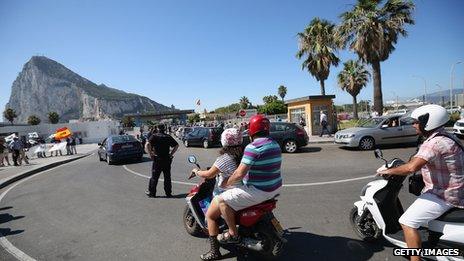Gibraltar tensions strain UK-Spain ties
- Published
- comments

Spain's tougher border checks have led to long queues of traffic
Is Gibraltar a useful distraction for the Spanish government? That is the question British officials have been pondering over recent days.
Is Madrid set on ratcheting up tension to deflect attention from a corruption scandal engulfing Prime Minister Mariano Rajoy and an ailing economy which just might see growth by the end of the year?
The Spanish dismiss such questions. They insist that the tension started when the government of Gibraltar began dropping 70 concrete blocks into the sea and creating an artificial reef in order to replenish fish stocks. Madrid says it has damaged the livelihoods of Spanish scallop dredgers.
At the weekend the Spanish Foreign Minister, Jose Manuel Garcia-Margallo, declared "the party's over". He threatened to charge motorists 50 euros (£43) for crossing the border, to impose flight restrictions and to investigate the tax status of 6,000 Gibraltarians who have properties in Spain. On recent occasions new, rigorous border checks have resulted in six-hour queues.
The British ambassador in Madrid has made a formal complaint about the threat of imposing charges. Today - in a reflection of the seriousness of the crisis - David Cameron spoke directly to Mr Rajoy. The conversation was described as "constructive" and, according to Downing Street, Mr Rajoy promised to ease the border controls. (A subsequent Spanish government statement made no mention of concessions on border controls.)
Spain insisted, however, that its fishing rights had been violated. The two foreign ministers will now meet to try and resolve these issues. David Cameron made it clear that "Britain will always stand up for the people of Gibraltar".
Economic magnet
It may be that a meeting finds a compromise and the Rock continues on its comfortable way. It has a budget surplus of £37m, GDP growth of 7.8% and GDP per capita of £41,138. Thousands of people from nearby towns like La Linea depend on doing business with the Rock. But there will always be tension. Spain claims sovereignty over Gibraltar, while its people - about 30,000 in total - are determined to remain British.
It is relatively easy for the Spanish authorities to make life difficult. The British have been examining whether they could mount a legal challenge under EU law to any border charges. Would a levy be permitted under the EU rules governing free movement? The think tank Open Europe says that "discrimination is clearly prohibited for the purpose of employment... however, the right to free movement covers the right to live and work in another member state. It does not address the more specific issue of travelling between two member states for this purpose". So the legal rights are not immediately clear.
Gibraltar, like the UK, is not part of the Schengen area, where EU citizens are generally free of passport checks. So Spain is entitled to impose controls on its border. But a spokesman for the European Commission said the action would have to be "proportionate". Whether a 50-euro charge on motorists falls into that category is hard to judge.
In any event, legal challenges would take time. Ultimately - as the leaders of Britain and Spain agreed today - they do not want the issue of Gibraltar to undermine relations between the two countries, and that might just lead to a lowering of tensions. In 2012, 13.6 million British visitors flew to the Iberian peninsula. A lot of those travellers spent money in Spain.
- Published26 November 2013
- Published19 May 2023